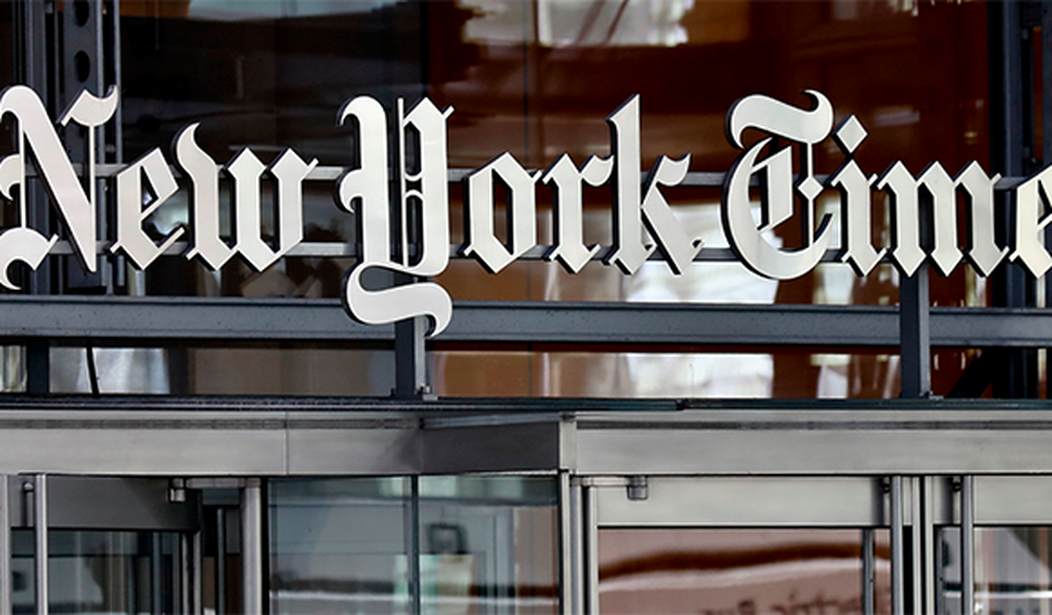We all know the NY Times‘ coverage of the hospital explosion was a mess. More than a week ago we were keeping track of the various ways in which the Times had botched it. For instance these shifting headlines:
NEW: @IsraelWarRoom blasts New York Times for editing headline on the powerful missile that bombed hospital in Gaza slaughtering hundreds of civilians, says, "We see you stealth-editing your headlines to cover your lies, @nytimes" pic.twitter.com/ouRzPYIY7H
— Simon Ateba (@simonateba) October 18, 2023
And also the misleading photos which came from another explosion far away from the hospital.
In one of its first tweets about the bomb at al-Ahli al-Arab hospital, The New York Times used a photo from a different bombing site.
I’ve traced the photo to Khan Yunis in southern Gaza, which is approximately 25 km from Gaza City where the hospital is located. https://t.co/TJj2HNU9mx pic.twitter.com/VHg8lnjaYP
— Yashar Ali 🐘 (@yashar) October 18, 2023
Vanity Fair has gotten a look at some NY Times Slack messages which show how this debacle unfolded behind the scenes.
On the afternoon of October 17—shortly after the Times published its first version of the story, with the headline, “Israeli Strike Kills Hundreds in Hospital, Palestinian Officials Say”—a senior news editor tagged two senior editors on the Live team and wrote, “I think we can be a bit more direct in the lead: At least 500 people were killed on Tuesday by an Israel airstrike at a hospital in Gaza City, the Palestinian authorities said.”
One of the tagged Live editors replied, “You don’t want to hedge it?”
A junior reporter for the Times who has been covering the conflict for the paper from Jerusalem chimed in: “Better to hedge.”
The senior news editor replied, “We’re attributing.”
By “attributing” he meant that the banner headline ended with “Palestinians Say” which the senior editor thought was enough to cover them in case the headline was wrong. But within a few minutes an International desk senior editor stepped in to say the banner headline went “way too far.” Another editor asked what the problem was and the International desk editor explained it.
“I think we can’t just hang the attribution of something so big on one source without having tried to verify it,” the International editor said. “And then slap it across the top of the [home page]. Putting the attribution at the end doesn’t give us cover, if we’ve been burned and we’re wrong.”
Ultimately, some version of the “Israeli Strike…” headline remained at the top of the site for about two hours. It was another half hour after that before the Times removed the claim that “at least 500” had been killed.
It then took a week before the Times issued a story saying the Palestinian claims about the incident hadn’t been backed up. Ed wrote about that here. This is basically the Times walking back their own “Palestinians Say” headline. The paper also put out an editor’s note which admitted mistakes were made.
The Times’s initial accounts attributed the claim of Israeli responsibility to Palestinian officials, and noted that the Israeli military said it was investigating the blast. However, the early versions of the coverage — and the prominence it received in a headline, news alert and social media channels — relied too heavily on claims by Hamas, and did not make clear that those claims could not immediately be verified. The report left readers with an incorrect impression about what was known and how credible the account was…
Given the sensitive nature of the news during a widening conflict, and the prominent promotion it received, Times editors should have taken more care with the initial presentation, and been more explicit about what information could be verified.
Executive editor Joe Kahn also gave an interview to one of the paper’s own podcasters Lulu Garcia-Navarro. She asked decent questions but mostly got robotic answers.
“Given Hamas’s role in this story, given that it had just attacked and murdered hundreds of Israelis, one thing that I’ve been trying to understand is it would have been easier to err on the side of caution,” Garcia-Navarro said. “I mean, this wasn’t a scoop by the Times. If there was any question whatsoever of who was responsible, wouldn’t it have been easier to sort of be very forthcoming with the audience about that and lean into the ongoing ambiguity, given the significance and the stakes of this? Why didn’t the Times do that?”
Kahn replied that the editor’s note was their effort to “reflect” on that, whatever that means. How about demoting or firing the idiot who posted that headline and the editors that defended it? How about promoting the people who quickly told them on Slack that they were wrong. It’s not like this is a brand new conflict with unknown figures involved. If you don’t know by now that Hamas word can’t be trusted, you shouldn’t be a senior editor at a newspaper.
Finally, the Times still seems to be doing its best to rescue it’s own credibility by suggesting that maybe they weren’t wrong after all, though the story falls well short of proving that. But even if definitive proof turned up tomorrow that Israel fired the missile which hit the hospital parking lot, that would not retroactively justify the Times‘ poor coverage. You don’t get credit for accidentally being right, only for being accurate with the best information available at the time.








Join the conversation as a VIP Member